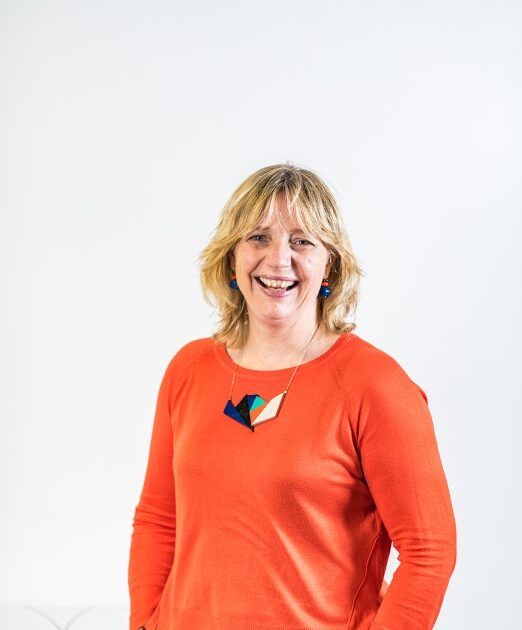
From the outset of our in-depth inquiry on the future of ageing, we have worked to engage with diverse groups of older adults to inform our report and recommendations. This has included running a series of creative engagement workshops to enable our working group to hear directly from older people about their experiences of science and health technologies, and their views on how these might affect their lives in future.
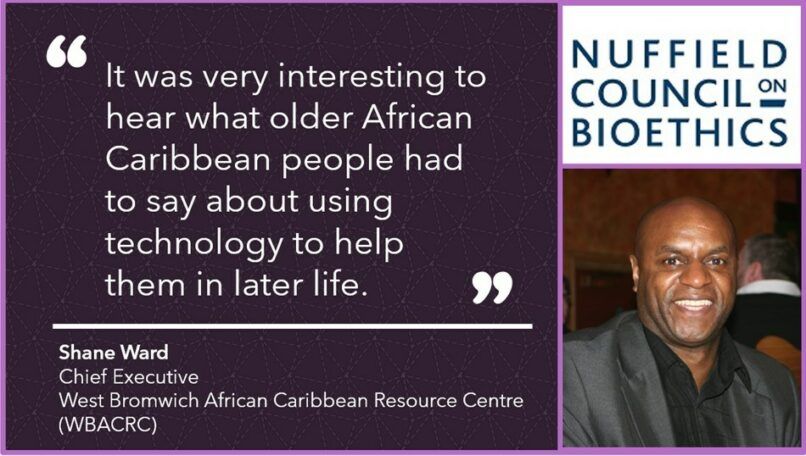
Perhaps predictably, one of the first questions I asked when approached to be Chair of the Nuffield Council inquiry on the future of ageing was: ‘how will people be involved in this work?’. I was glad to receive a positive and constructive answer. Two years on, Molly Gray and I reflect here on how the inquiry has connected with people, and how it has been informed by the people for whom it is most relevant. And therein lay our first challenge: a guiding principle set out by the HRA’s best practice principles for public involvement is that you should ‘involve the right people’ and ‘involve enough people’. No mean feat when ageing is relevant to all of us.
A second challenge was timing. Our plans for involvement were conceived in the winter of 2020-2021, with the impact of COVID-19 still uncertain when it came to thinking about dialogue events, workshops and meetings. Nevertheless, we put forward an ambitious engagement programme with the aim to be as inclusive as we could within the limits of our budget and emerging from the COVID pandemic. We planned:
- Five engagement workshops, virtual and in-person, each working specifically with people who might be less well listened to, creatively exploring their perspectives on science, technological innovation, and ageing. These ran synchronously with the inquiry, informing our working group deliberations.
- A larger-scale deliberative public dialogue: stimulating people from varied backgrounds and with experience of different health conditions to come up with their own recommendations for the future of ageing as well as critically appraising the emerging recommendations and reflective ethical framework working group.
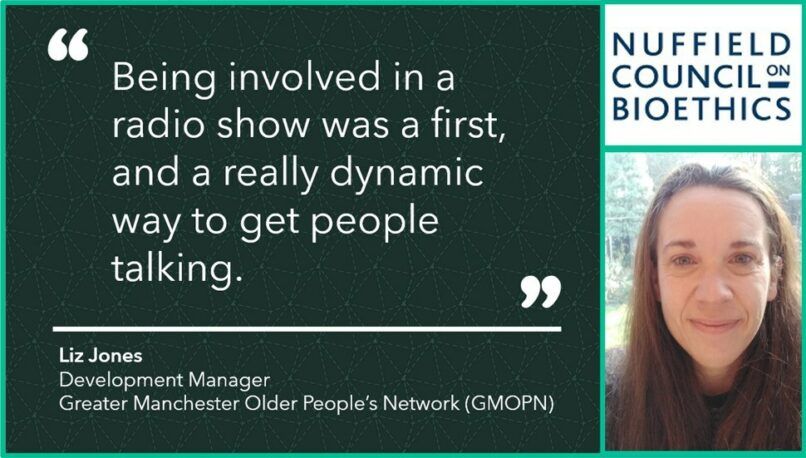
Creative engagement workshops
We chose creative methods for these workshops as our experience shows that arts-based approaches can level power relationships when it comes to subjects where technical knowledge might be privileged over other forms of wisdom. Also, being creative provided the opportunity to produce accessible outputs from the workshops, for wider engagement, and which informed the discussions of the working group. In total, 80 people from all walks of life took part in the engagement workshops. All workshops were co-designed with the people and organisations who hosted them and were professionally facilitated. With consent, we collected demographic data from participants to understand whose voices were being aired. The workshops included:
- Working with the Bristol Older People’s Forum where we used drawing to elicit how science and technology can help, or indeed hinder, people in older age. Facilitated by Muna Al-Jawad, working group member and graphic medicine artist, a summary cartoon of the workshop discussions was produced called ‘Alice’s Adventures in Techland’.
- Inspired by poetry, music and radio, the Greater Manchester Older People’s Network and Sonder Radio provoked discussions on concerns about getting older, including hearing the experiences of participants self-identifying as LGBTQIA+. Discussions centred on the technologies that might be used to support them in older age, and what the future of ‘living well’ in older age might ‘look like’.
- Members of the West Bromwich African Caribbean Resource Centre, all aged 75 or older, examined photographs of various technologies in a focus group setting, to prompt discussions. Strong key themes emerged and are described in a separate blog.
- An intergenerational group, including nursing students, in Exeter watched the film ‘Uninvited Guests’ to stimulate views on the use of technology and developments and heard a presentation on targeting the underlying biology of ageing, with some key themes being expressed.
- Older adults with learning disabilities from Greater Manchester Growing Older with Learning Disabilities crafted ‘dream machines’ to explore how to improve healthy ageing; described in a previous blog. In a separate workshop, members of Manchester People First interviewed and filmed members of the group to further explore their hopes, fears and futures for science, technology and ageing, the video can be found here.
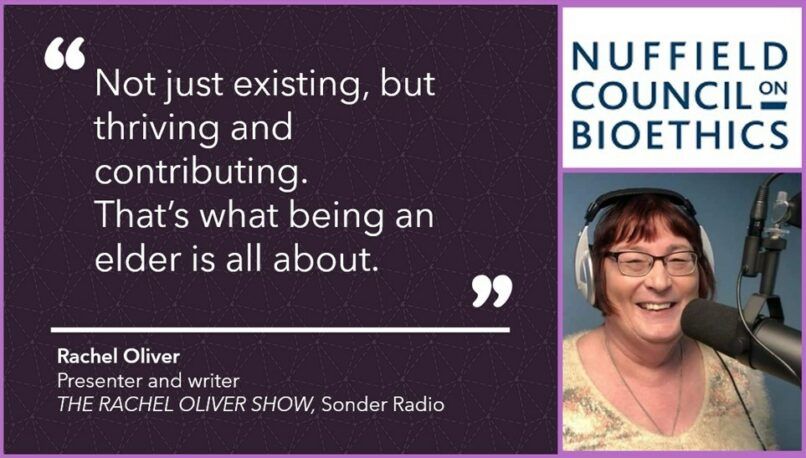
Summary of dialogue
Following the creative engagement workshops, we ran a small deliberative public dialogue. The aim of the dialogue was to ‘stress test’ the recommendations that have been developed throughout the inquiry to make sure these recommendations are reflective of the views and values of citizens as well as experts. The Nuffield Council on Bioethics appointed the research organisation, BritainThinks to deliver the dialogue. The design of this dialogue in particular was based on three key principles:
- Inclusion: it was important to hear from as wide a range of people as possible and ensure that participants were a cross-section of society.
- Creativity: the dialogue used creative tools, like immersive scenarios, to engage with the subject matter tangibly, and emotionally, not just intellectually and in the abstract.
- Focus: the design aimed to focus participants on the topic of healthy ageing and allow sufficient time to dig deeply into the recommendations once participants were immersed in the topic.
Working with professional recruiters, a total of 24 members of the public were recruited from two areas in England: Kent and West Yorkshire. Participants took part in three workshops (one in-person and two online), where they were introduced to the concept of ageing and the current process of research and development within ageing research. Presentations from experts stimulated participants to come up with their own recommendations for reaching a better future for ageing before introducing the inquiry’s emerging recommendations which were discussed and refined in the final workshop. An interactive overview of the dialogue published today details the participant-generated recommendations and conclusions.
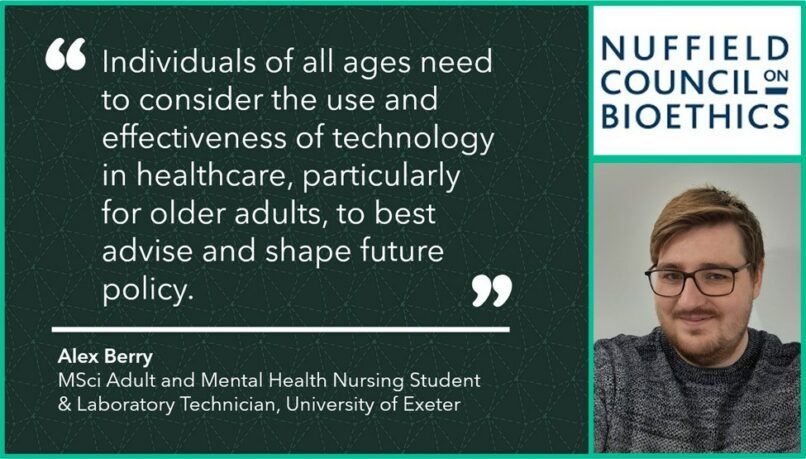
What we learned
Our engagement activities ran alongside our working group deliberations and our report highlights how and where learning from these activities influenced and guided our recommendations. Working group members joined the engagement activities, and more generally brought their experience of working with older adults in their wider work. However, of course, we are very aware that our engagement was not exhaustive and that there many communities and sections within society that we did not reach, within our timeframe and resources such as travellers’ communities.
At the outset, we thought long and hard about having lay members on the working group. We balanced the need to hear from as many different perspectives as possible with a more restricted format of involvement. As working group members, we also brought to bear our own experiences of ageing to the group as ‘older’ and ‘younger’ people of chronological age, as unpaid carers including for those living with precarious housing and mental health considerations, as members of racially minoritised communities, and family members of older people with vibrant lives but who felt othered by society, science and technology. As a public involvement professional, I often rail against the argument that ‘professionals’ employed within research and/or health spheres can also wear hats/be considered as ‘public’ contributors drawing on their own lived experience. Perhaps, because ageing affects us all, there is room for flexibility here?
My experience of the last two years of being part of this working group, and hearing from everyone I encountered in our engagement activities, has opened my eyes to just how mixed our experiences of ageing are, that old age is not something to be endured but rather enjoyed, and thinking so entrenches ageist and unhelpful attitudes. Science and technology have the potential to help us flourish in later life, by understanding, diagnosing and improving health conditions in older age and developing treatments, assistive technologies and preventive approaches. But only if it does so by placing the people it aims to affect at the forefront of its practice, addressing the unacceptable inequalities that persist into older age, and considers the many ways in which society needs to change in order better to meet the needs of older adults.
With thanks to: everyone who took part in our workshops and the public dialogue; all of our partner organisations who supported our workshops; and Molly Gray, Researcher at the Nuffield Council on Bioethics.
Related projects
-
In-depth inquiry